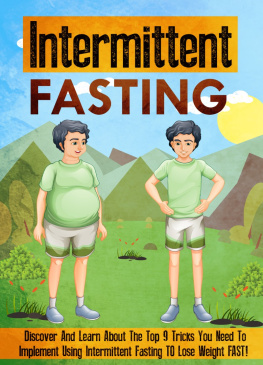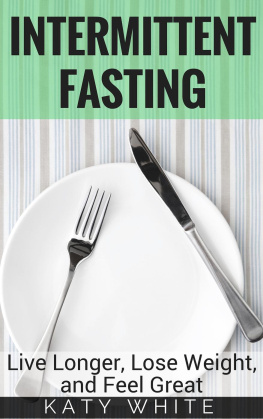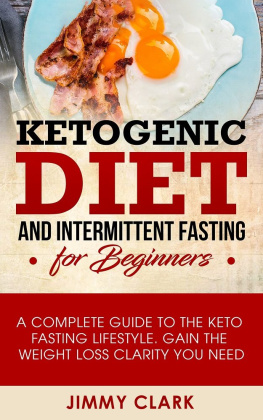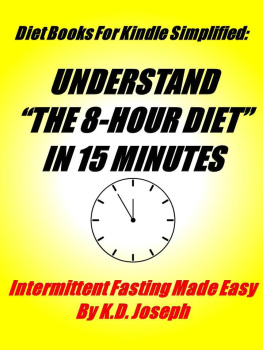This book is dedicated to thosewho are making every effort to lose weight and keep it off.
Chapter 1- What Are Fasting Diets and How Do They Work?
Severalreligions practice times of fasting as a way of demonstrating their penitenceor faith, and they use this time as an opportunity to reflect spiritually. Inthe past, fasting was also a means of expressing ones political views or as away to protest something.
Eventhough fasting might not be the most practical or safest diet, there are peoplewho believe in fasting and use it to lose weight and to help rid their body oftoxins. Experts tell us that our natural body is equipped with the right organsto do that job itself. The way that fasting is used to lose weight varies bythe diet one is on. There are some fasting diets that involve eating nothingbut raw foods for one or more days in a row and drinking only water, whileother fasting diets alternate days that they restrict food eating. Some otherfasting diets will allow only specific liquids like tea, juice and water. Otherswill cut back dramatically on calories, but they dont totally eliminate foodaltogether.
Whenyou start a fast, your body is being forced to tap into energy stores so thatit can get the fuel it needs to keep moving. Consequently, you will loseweight. The real question is how long you are going to keep that weight off.Years and years ago, our ancestors dealt with the fact that food was oftenscarce, so our bodies are genetically programmed to fight the effects of thefasting.

First,when you begin to eat less food, your metabolism is going to slow down andstart to conserve energy. When you start back to your usual diet, yourmetabolism that lowered might cause you to start storing more energy. Theresult is that you will probably gain back the lost weight and maybe even puton a few more pounds when you stick to eating the same amount of calories aswhen you started fasting.
Whenyou begin a fast, your body will begin adjusting by lowering your appetite.Initially, you will feel a lot less hungry. When you stop the fast, you willfind that your appetite hormones jump back into high gear causing you to feel alot hungrier and potentially leading you to binge.
Someof the fasting diets claim to cleanse the impurities out of the body. However,there has been no evidence to show that fasting cleanses the body, or that thebody needs being detoxified. Our body is designed naturally to remove toxinsthrough the skin, kidneys, colon and liver.
Somestudies of fasting performed on humans and rodents indicate that there is aconnection with longevity and calorie restriction. In a study of men and womenwho were all overweight, a diet that restricted calories improved body temperatureand insulin levels.
Noone, including researchers, knows whether fasting increases our lifespan ornot. It has not been closely followed long enough to know. However; the mereconcept of skipping a meal on purpose on an ongoing basis is gaining a lot ofattention. It does appear to be a good, safe way to lower calorie intake and iseasier for people to do this way.
Intermittentfasting can be done several different ways based on a persons lifestyle,individual needs, goals and so forth. However, the two most popular methods ofintermittent fasting are longer intermittent fasting two times a week andshorter daily intermittent fasting. The longer intermittent fasting takes alonger period of time, say up to 24 hours of fasting, and repeating that onceor twice a week. That being said, 24 hours is not actually skipping an entire day.For instance, you would stop eating food around 6:00 p.m. on Wednesday and eatyour next meal at 6:00 pm on Thursday.
Withthe shorter daily intermittent fasting, it is done a few times a week,sometimes daily, with a smaller window of eating time. For example, a personcan eat all their calories in an eight-hour window, and the fasting is doneafter the eight hours.
Inthe end, it is all about finding a way of fasting that works best for you.Choosing the approach that fits your specific lifestyle is the best way to seeresults.
Thepros for the long fast are:
It allowssomeone to get enough calories on their non-fasting days.
It keeps mealmaking simple.
It allows you toeat normally on the non-fasting days.
The cons for thelong fast are:
There is a chanceof binge eating after such a long fast.
Longer fasts cancause more stress on the body and could be dangerous for someone with a highstress level.
It may not workfor someone extremely active if the calories are too restrictive.
Thepros of the daily intermittent fasting are:
The eatingschedule is consistent and simple (every day).
Allows the bodyto adjust to hunger.
Focuses more onthe importance of healthier food choices.
Shorter fastingwindows are less stressful.
Thecons of the daily intermittent fasting are:
It couldpotentially cause a plateau in weight loss if the calories remain too low fortoo long.
It might not begood for highly active people who need high calorie demands.
Fastingfor one or two days is probably not harmful for anyone who is healthy, as longas they are maintaining a good intake of fluids. However, when fasting forlonger periods of time, it can be dangerous. Our bodies need a good variety ofnutrients, vitamins and minerals from food in order to stay healthy. When we dontget enough vitamins and nutrients because of a fasting diet, it can lead todangerous symptoms like gallstones, constipation, fatigue, dizziness,dehydration and cold intolerance. Some people have actually died from fastingtoo long.
Forpeople with type I diabetes, fasting is not recommended because it can causedips and spikes in the levels of blood sugar. Pregnant women, breastfeedingwomen or anyone who is ill with a chronic disease should not try fasting.
Likemost other diets, it is always better to talk to your doctor to see if fastingis appropriate and safe for you.
Chapter 2- Does Fasting Help YouLose Weight?
Fastingis known to be one of the most beneficial and most effective dieting strategiesto help individuals lose a serious amount of weight. Whether you decide to tryintermittent fasting, a 24-hour fast or a juice fast; fasting can help youdetoxify your body of unwanted pollutants, to develop mental clarity,facilitate fat loss and increase your overall energy levels. Here is a comprehensiveoverview of how fasting can help you lose weight and achieve the physique ofyour dreams.














